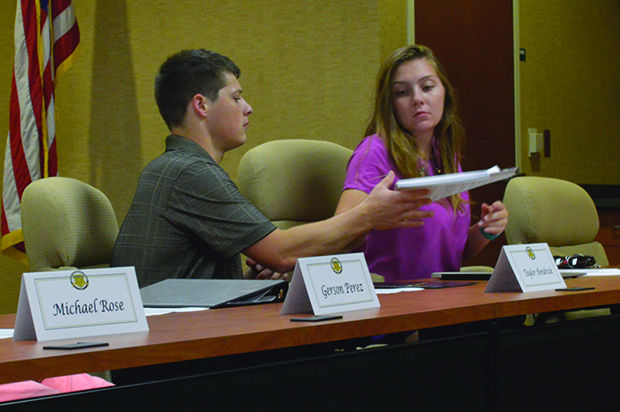Student Senate holds closed meeting
Student Senate members Taylor Hendricks and Ashley Nicholson recieve a list of Amendments and Bylaws during the Student Senate meeting September 24, 2015.
The student newspaper and Student Senate at Missouri Southern have come to different conclusions on whether the Student Senate is a public body subject to open meetings laws. The disagreement came about after the Senate closed a finance committee session regarding an appropriations request Wednesday night.
The Student Senate is an official governing body, and Missouri’s open meeting law requires meetings to be open to the press and public. The Sunshine Law, or Section 610.010 through 610.030 RSMO 1986, calls for certain proceedings of government agencies to be open or available to the public.
Student Senate President Kyle Prisock asked The Chart to leave the finance committee meeting just as a proposal to appropriate $738 to the Student Nurses Association was about to be called for a vote. Olivia Massey, senior nursing major and SNA member, brought the request for funding to the committee to finance a trip for the six executive officers of the club to attend a nursing conference in St. Louis.
Prisock entered the meeting after treasurer Victoria Miller requested clarification on media procedure. Prisock then informed the committee they could call a vote to close the meeting; that motion passed unanimously.
Missouri state Attorney General William L. Webster issued an opinion in 1987 that is still valid today. Webster reported that a student government association in Missouri is not always a “public body” covered by the Sunshine Law, but it can be covered by the Sunshine Law if it is exercising a function delegated by the Board of Regents. Budgeting student fee money is a power that is appointed by the Regents. In fact, it’s the most significant power a student government association exercises.
“The committee deliberations and resulting recommendations are not open to the public, nor are they disclosed before being presented to the Student Senate body,” said Prisock.
According to Frank LoMonte, executive director of the Student Press Law Center, student journalists are unquestionably allowed to attend any portion of a Student Senate meeting at which votes are cast involving appropriations.
“The burden is on the governmental authority closing a meeting to justify why it is being closed,” he said. “The president’s claim that he has authority is meaningless unless he points to something in the law that exempts the Student Senate from compliance, which I do not believe he can do.”
LoMonte went on to state that the Student Senate could incur financial penalties under the Sunshine Law, in addition to having any vote taken in an improperly closed meeting being declared void.
“Whatever votes were taken in this meeting are under a legal cloud,” said LoMonte.
This is the first time in several years that a reporter has been asked to vacate a Senate meeting at Southern.
Your donation will support the student journalists of Missouri Southern State University. Your contribution will allow us to purchase equipment and cover our annual website hosting costs.




























